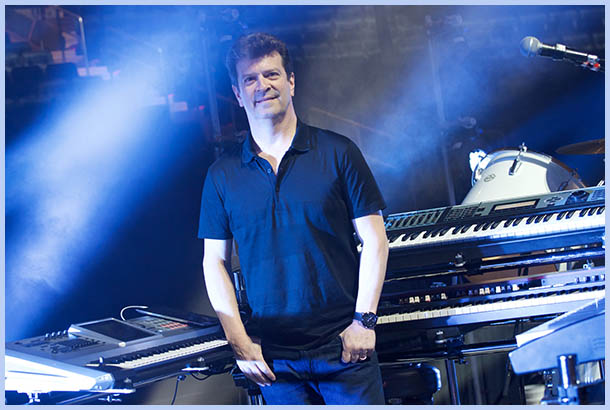|
David Rosenthal The Piano Man's Keyboard Man  Your career got its start when you replaced Don Airey in Rainbow, at the start of the '80s. How did a young Berklee grad even land that audition? [laughs] Well, right place at the right time, I suppose? I don't know. A friend of mine knew a friend of Ritchie's [Blackmore] and that's how I found out that he was looking for a keyboard player. So I sent him a cassette of my senior piano recital—which I had done two years earlier when I was a sophomore. [laughs] It's all classical stuff. Some Liszt and some other things. I knew that Ritchie liked classical music. I also sent him a tape of my cover band at the time, which in those days we were playing a lot of Kansas—more proggy stuff, and some heavy stuff. Not quite as heavy as Rainbow, but, I sent him that. He liked it enough to invite me down to an audition, which was like a cattle call audition. And then, you know, I got the callback and it was down to me and one other guy and then I got the gig. I was 20 when I joined Rainbow. That must have been intimidating! I wasn't intimated, no. I was excited. I thought it was cool. I was, like, this is great. I just do what I do. I don't think I got intimated because I went down and I did what I did and, if what I did is right for what he was looking for, then I'll get the gig. And if it's not, then that doesn't mean that I'm less good at what I do, it just means maybe I wasn't right for that band. My advice to a lot of players out there, especially younger kids, is when you guys do auditions, go in and do it as best you can, go in with that attitude. But if you don't get the gig, it's not the end of the world. Maybe you're just not the right type of player that they were looking for stylistically—or who knows. But it doesn't mean that you're less of a musician or less qualified. It just means it wasn't the right fit. So you go back home and get back on the horse and something else will come along. You were the keyboard player for two of the most iconic world tours of the '80s. Cyndi Lauper's True Colors tour and Robert Palmer's Heavy Nova tour. Well, we'll start with Cyndi Lauper. Her music was very keyboard-heavy with lots of parts going on. It was completely different from Rainbow and from a tour [I did] with Little Steven in-between there, as well. Years ago you put together an AOR rock group of your own, Red Dawn, featuring drummer Chuck Burgi and bassist Greg Smith. The CD received excellent reviews. Have you ever thought about doing a new band project today or perhaps a follow-up to that Red Dawn release? There's been a lot of offers to do a follow-up, but we've all gone off in different directions. That style of music doesn't really have a big place in the world, sadly, because it's great stuff. Not just my record, but that whole genre of stuff. I just don't see that in the cards to do another Red Dawn record. I think that record stands well on its own. I'm really proud of it. Probably if it came out maybe three or four years earlier, it would have been huge. But that's the way it goes. It came out right when the whole tide was turning stylistically in the world. But, yeah, it was a lot of fun to make that record. Great musicianship on that. I really enjoyed making that record and, to this day, it's fun to pop it on every once in a while and listen to it. Who are some other artists today that, if the phone rang, you'd love to go out and play with? Well, actually, I got asked by Ritchie Blackmore to do a Rainbow reunion, which I would have been happy to do but it didn't coincide with my Billy schedule, unfortunately. I would have loved to do that. It would have been a lot of fun.. © Scott Kahn, MusicPlayers.com - November 6, 2017 |